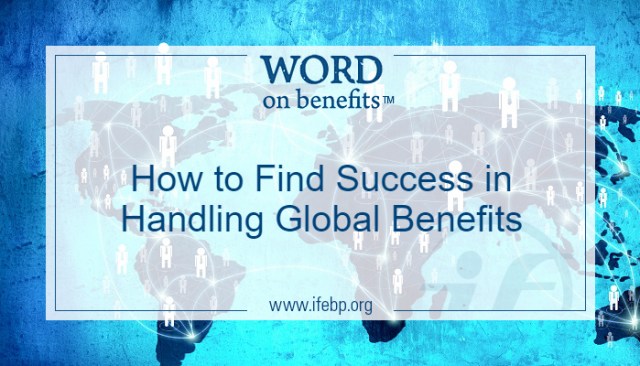
I recently had the opportunity to attend our Certificate in Global Benefits Management program. Throughout my years here at the International Foundation, I’ve talked with members who work in multinational companies about benefits, compensation and HR issues impacting their expatriate and local national employees. Hearing about the intricacies of global benefits management has always left me amazed AND scratching my head—so I welcomed the chance to learn more.

A key element for success in global benefits is an effective strategy. Bert Defever of Willis Towers Watson, the instructor for that topic, shared why a strategy—and a corresponding governance framework—is important. Four main reasons are:
- To ensure benefit programs provide what global workers need, while also aligning with business objectives
- To ensure proper cost management and allocation
- To ensure risks are adequately and efficiently managed
- To verify programs are compliant with local laws and regulations.
[Looking for a network of global benefits peers? Join the Foundation Community—Global Benefits, a private online discussion group to connect, share and learn from other global professionals.]
Mr. Defever suggests a first step should be the development of a benefits philosophy that outlines the company’s position on benefits and rewards. Why does your company offer benefits? What are they and how are they offered? Which benefits are needed, and how much are you willing to pay?
When pulling together a global benefits management strategy, several areas need to be considered:
- Plan design—Keep in mind demographics, benchmarks, social insurance programs, mandates and collective bargaining agreements.
- Finance and cost management—Choose appropriate benefit vehicles, be aware of accounting requirements and look at preventive measures like wellness.
- Administration and delivery—Understand compliance and reporting requirements, budget carefully and mediate between employees and providers.
- Vendor management—Consider financing options like insurance, a trust or self-insurance; look at pooling, captives and preferred vendors; and understand who has fiduciary responsibility.
- Disclosure and communication—Document, communicate, educate and report.
Thoughtful consideration of the above—both at the start and ongoing—can minimize risk and inefficiencies. A successful strategy leads to good global governance, leading to consistency, accountability and compliance, all critical factors when dealing with the uncertainties of global benefits.
![]()
Julie Stich, CEBS
Associate Vice President, Content at the International Foundation




